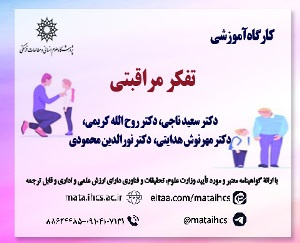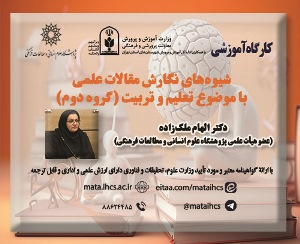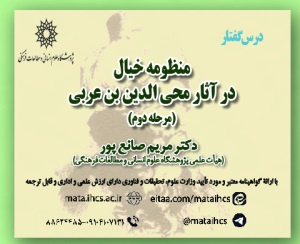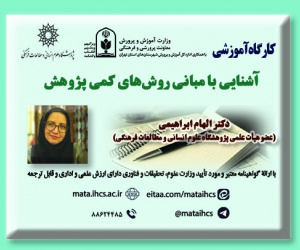پیش بینی تحمل پریشانی در سالمندان بر اساس حمایت ادراک شده، اجتناب تجربی و هوش معنوی با نقش میانجی ذهن آگاهی (مقاله علمی وزارت علوم)
درجه علمی: نشریه علمی (وزارت علوم)
آرشیو
چکیده
سالمندان به دلیل پریشانی های روانشناختی و احساسات منفی در این دوره از قبیل احساس شکست در تلاطم ها، استرس ها و فشارهای زندگی، دچار چالش های بیشتری م ی شوند در نتیج ه این ادراک بالاتر اس ترس، موجب پایین آمدن کیفیت و روابط زندگی آن ها خواهد شد. از این رو پژوهش حاضر باهدف تدوین الگوی تحمل پریشانی در سالمندان بر اساس حمایت ادراک شده، اجتناب تجربی و هوش معنوی با نقش میانجی ذهن آگاهی انجام گرفت. روش پژوهش توصیفی و از نوع همبستگی بود که در قالب تحلیل مسیر انجام شد. جامعه آماری پژوهش حاضر سالمندان شهر تهران در بازه سنی ۶۵ تا ۸۰ سال بودند که 3۰0 نفر از آنان با روش نمونه گیری در دسترس انتخاب شدند. ابزار گردآوری اطلاعات در این پژوهش مقیاس مقیاس حمایت اجتماعی ادراک شده (198۸)، پرسشنامه هوش معنوی کینگ (2008)، مقیاس تحمل پریشانی سیمونز و گاهر (2005)، مقیاس ذهن آگاهی براون و ریان(2003) و پرسشنامه اجتناب تجربی چندبعدی گامز و همکاران (2011) بود. داده های حاصل در سطح توصیفی با استفاده از میانگین و انحراف استاندارد و در سطح استنباطی با استفاده از آزمون همبستگی و تحلیل رگرسیون و تحلیل مسیر برای بررسی نقش میانجی، با استفاده از دو نرم افزار SPSS و AMOS تحلیل شدند. نتایج حاکی از این بود که مدل تدوین تحمل پریشانی در سالمندان درمجموع از برازش قابل قبولی برخوردار است. این موضوع نشان می دهد که متغیرهای حمایت ادراک شده، اجتناب تجربی و هوش معنوی با تحمل پریشانی به صورت مستقیم ارتباط دارند. رابطه ذهن آگاهی با تحمل پریشانی به طور مستقیم معنادار بوده و همچنین اثر غیرمستقیم حمایت ادراک شده، اجتناب تجربی و هوش معنوی با تحمل پریشانی با میانجی گری ذهن آگاهی معنادار است (05/0>P). نتایج حاکی از آن است که حمایت ادراک شده، اجتناب تجربی و هوش معنوی با نقش میانجی ذهن آگاهی در تحمل پریشانی سالمندان بسیار مهم و تأثیرگذار است.The Prediction of distress tolerance model in the elderly based on perceived support, experiential avoidance and spiritual intelligence with the mediating role of mindfulness
Due to the psychological distress and negative emotions during this period, such as the feeling of failure in the turbulences, stresses and pressures of life, the elderly face more challenges. Their lives will be Therefore, the present study was conducted with the aim of developing a distress tolerance model in the elderly based on perceived support, experiential avoidance and spiritual intelligence with the mediating role of mindfulness. The research method was descriptive and correlation type, which was done in the form of path analysis. The statistical population of the present study was the elderly of Tehran between the ages of 65 and 80, of which 300 were selected using available sampling. The data collection tools in this research are Perceived Social Support Scale (1988), King's Spiritual Intelligence Questionnaire (2008), Simmons and Gaher's Distress Tolerance Scale (2005), Brown and Ryan's Mindfulness Scale (2003) and the Multidimensional Experiential Avoidance Questionnaire by Gomes and colleagues (2011). The resulting data were analyzed at the descriptive level using mean and standard deviation and at the inferential level using correlation test and regression analysis and path analysis to investigate the role of mediator, using SPSS and AMOS software. The results indicated that the model for developing distress tolerance in the elderly has an acceptable fit. This shows that the variables of perceived support, experiential avoidance and spiritual intelligence are directly related to distress tolerance. The relationship between mindfulness and distress tolerance is directly significant, and also the indirect effect of perceived support, experiential avoidance, and spiritual intelligence with distress tolerance with the mediation of mindfulness is significant (P<0.05). The results indicate that perceived support, experiential avoidance and spiritual intelligence with the mediating role of mindfulness are very important and effective in coping with the distress of the elderly.






